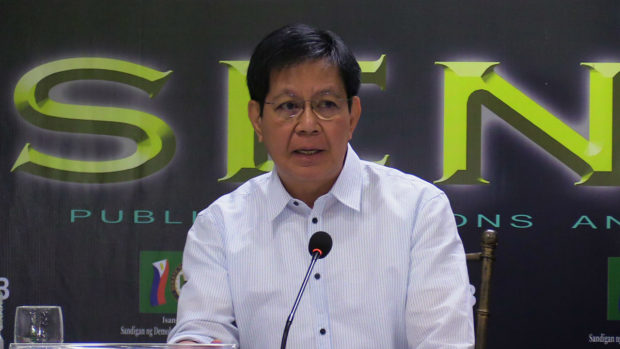Lacson: Pork insertions stall budget
It’s the House of Representatives’ last-minute “pork barrel allocations” that are delaying the passage of the proposed P3.757-trillion budget for 2019, making a reenacted budget possible, according to Sen. Panfilo Lacson.
Mincing no words, Lacson on Monday blamed House members for inserting funds for their pet projects in the general appropriations bill, leading to delays and forcing the Senate to adjust timelines.
“They defy the rules just to make way for their pork,” the administration senator told reporters in a text message.
“And I dare say, it’s all the fault of the . . . House that their insertions aka pork barrel allocations, which I guess is their main reason for the delay, will not be implemented if the national government operates under a reenacted budget,” he said. “It serves them right.”
Pork barrel allocations, a source of kickbacks, finance the pet projects of lawmakers.
Article continues after this advertisementHouse leaders have denied inserting last-minute pork barrel allocations in the budget measure.
Article continues after this advertisementPower shift
At a press briefing, Lacson said he surmised that the last-minute changes to the appropriations bill was the result of the power shift in the House after Speaker Gloria Macapagal-Arroyo staged a coup in July to oust Davao del Norte Rep. Pantaleon Alvarez.
Since the original expenditure program reflected appropriations that largely benefited Alvarez’s allies, Arroyo’s supporters soon began introducing changes in the bill to their own advantage once Arroyo had taken over, the senator said.
Opposition Sen. Antonio Trillanes IV shared this view, noting that the GMA group was different from the Davao group.
“These are different groups clashing. Even if they are allied, they have different interests,” Trillanes told reporters in an interview in his office.
Lacson said it was highly irregular that the House continued to accept amendments to the bill even after it had been passed on second reading. “It is quite anomalous, to say the least,” he said.
Under House rules, the period of amendments occurs before voting on second reading.
The House approved the budget bill on second reading on Oct. 3.
A House leader on Monday said the chamber would only be able to pass the budget on third reading on Nov. 28, leaving the Senate little time to scrutinize the appropriations bill before the Christmas break.
“We’re at the final stages of reconciling differences and amendments to the budget, and after that we need to get the budget printed,” Compostela Valley Rep. Maria Carmen Zamora, chair of the House committee on appropriations, said in a text message.
Lacson said that by then, the Senate would have six session days left before adjournment on Dec. 12.
He said this was not a reasonable amount of time to pore over the thick volumes of the budget proposal.
“We are not superheroes in the Senate to finish scrutinizing the House version of the budget bill, including all the study and research prior to plenary debates, amendments, etc.,” he added.
Waiting for House version
“Further, once they approve on third and final reading, it takes 10 days, give or take, to print the general appropriations bill prior to transmittal to the Senate,” Lacson said.
He said that this early, it was not difficult to predict a reenacted budget in 2019.
The Senate finance committee chaired by Sen. Loren Legarda, per usual practice, is already in the middle of panel discussions on the proposed 2019 budget, though the Senate will need to receive the House version before passing its own.
Senate President Vicente Sotto III said the possibility of a reenacted budget was “not remote.”
“We don’t want that, but if the delay is too much, what can we do? We cannot just say ‘amen’ [to the House version],” he said.
If the budget is reenacted, it would be the first under the Duterte administration.
Election year
A reenacted budget has historically given the sitting President wider latitude to spend funds already appropriated in the current year and automatically appearing as savings.
Lacson observed that Arroyo’s presidency had been marked by reenacted budgets, especially during an election year.
“This would often happen under the former President every time there is an election. With a reenacted budget, they could throw the budget at anybody they want because it’s basically a huge lump sum,” he said.
“Congress has no control except oversight,” Lacson said.
Trillanes, however, said the form of a reenacted budget had changed since the Supreme Court ruling on the discontinued Disbursement Acceleration Program.
“Simply put, there will be no projects, no new items, no salary increases,” he said.
But Trillanes said he understood why House members were making such last-minute insertions into the budget bill.
“To be fair to the congressmen, they exist there to represent their districts, so if the districts need funding, they will advocate for those interests,” he said. —With a report from Marlon Ramos
